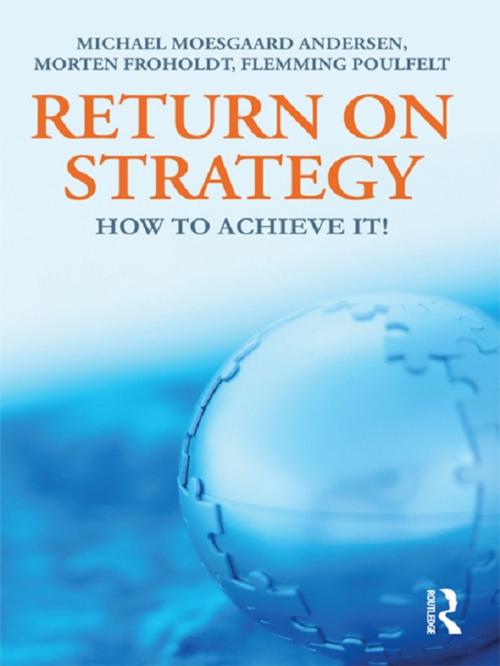Return on Strategy
How to Achieve it!
Business & Finance, Career Planning & Job Hunting, Consulting, Management & Leadership, Planning & Forecasting| Author: | Michael Moesgaard, Morten Froholdt, Flemming Poulfelt | ISBN: | 9781135215330 |
| Publisher: | Taylor and Francis | Publication: | December 4, 2009 |
| Imprint: | Routledge | Language: | English |
| Author: | Michael Moesgaard, Morten Froholdt, Flemming Poulfelt |
| ISBN: | 9781135215330 |
| Publisher: | Taylor and Francis |
| Publication: | December 4, 2009 |
| Imprint: | Routledge |
| Language: | English |
Why is it that many companies meticulously following recipes on management and strategy fail? Did Google, Skype, Ryanair, Huawei and a number of other successful companies buy into a well thought out strategy and adhered to that over time? How do companies deliberately opting out of the recipe game and opting into the out-of-the-box-thinking fare? In short, why is it that some companies achieve a higher Return on Strategy than others?
Whereas Return on Investment (RoI) has attracted increased attention over the last couple of decades, little, if any, attention is being paid to whether companies do at all achieve Return on Strategy (RoS) and how.
This book provides an overview of contemporary strategy literature and recipes brushed up with a view to identifying explanations as to how recipes has seldom worked as intended. One out of several reasons rests on the fact that recipes do not take the so-called X-factor into account.
With the X-factor as the starting point the book examines a sample of 50 global companies of which some has achieved a remarkable high Return on Strategy and others failed. The 50 companies covers most continents as some are from the North America, some are from the European continent and others are from different parts of the emerging Asian region – threatening companies from the Western hemisphere.
The book explains the reason behind success and failures and provides practical tools as to how companies may increase their Return on Strategy. In the toolbox, you will find a framework on how to increase the Return on Strategy as well a number of dynamic positioning tools, road maps and bearing points. Invariably, more and more companies - including consultants, business leaders and MBAs - now work diligently in order to increase their Return on Strategy and the best of them are here to stay successfully – are you?
Why is it that many companies meticulously following recipes on management and strategy fail? Did Google, Skype, Ryanair, Huawei and a number of other successful companies buy into a well thought out strategy and adhered to that over time? How do companies deliberately opting out of the recipe game and opting into the out-of-the-box-thinking fare? In short, why is it that some companies achieve a higher Return on Strategy than others?
Whereas Return on Investment (RoI) has attracted increased attention over the last couple of decades, little, if any, attention is being paid to whether companies do at all achieve Return on Strategy (RoS) and how.
This book provides an overview of contemporary strategy literature and recipes brushed up with a view to identifying explanations as to how recipes has seldom worked as intended. One out of several reasons rests on the fact that recipes do not take the so-called X-factor into account.
With the X-factor as the starting point the book examines a sample of 50 global companies of which some has achieved a remarkable high Return on Strategy and others failed. The 50 companies covers most continents as some are from the North America, some are from the European continent and others are from different parts of the emerging Asian region – threatening companies from the Western hemisphere.
The book explains the reason behind success and failures and provides practical tools as to how companies may increase their Return on Strategy. In the toolbox, you will find a framework on how to increase the Return on Strategy as well a number of dynamic positioning tools, road maps and bearing points. Invariably, more and more companies - including consultants, business leaders and MBAs - now work diligently in order to increase their Return on Strategy and the best of them are here to stay successfully – are you?















